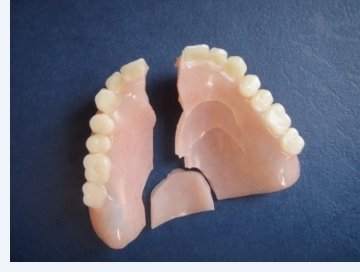For many people, dentures are a significant investment because they enhance their confidence in their ability to chew, speak, and smile. Dentures must be repaired and maintained on a regular basis, just like any other dental prosthetic, to keep them in good condition and ensure that they continue to work as intended. We'll cover everything you need to know about maintaining and repairing dentures in this article.
 Common Denture Repairs
Common Denture Repairs
- Relining: As the shape of your mouth changes over time, dentures may become loose and uncomfortable. A relining is a process in which the denture's base is remolded to better fit the contours of your gums and jaw.
- Rebasing: Rebasing is a process in which a new denture base is added to the existing denture. This is often needed if the original denture base has become worn or damaged.
- Additions: Over time, you may lose more teeth, which will affect the fit and function of your dentures. Additions can be made to your dentures to accommodate these changes.
- Cracked or broken dentures: If your dentures become cracked or broken, it's important to have them repaired as soon as possible to avoid any further damage.
Denture Maintenance
- Cleaning and disinfecting: Dentures should be brushed and rinsed daily to remove food particles and plaque. Use a soft-bristled brush and a mild soap or denture cleaner to gently scrub the dentures, being sure to get into all the crevices. Rinse thoroughly with water before putting them back in your mouth. Dentures should also be soaked overnight in a denture cleaning solution or warm water to remove any remaining debris and disinfect the dentures.
- Regular check-ups: It's important to visit your dentist or denture specialist regularly, at least once a year, to have your dentures professionally cleaned, disinfected and checked for any signs of wear or damage.
- Proper storage: Dentures should be kept in a safe place when not in use, preferably in a case specifically designed for dentures. Dentures should be handled with care and kept wet at all times to prevent warping or cracking.
- Eating habits: Eating hard or sticky foods can put extra pressure on your dentures, causing them to loosen or even break. To protect your dentures, avoid eating foods like hard candy, nuts and popcorn, and stick to softer, easier-to-chew options.
Denture repair and maintenance may seem daunting, but it's essential for keeping your dentures in good condition. Remember to brush and rinse daily, soak overnight, and visit your dentist or denture specialist regularly. Proper storage, handling, and eating habits are also key to ensure your dentures stay in good condition. With regular repair and maintenance, your dentures can continue to help you enjoy your smile with confidence.
Don't hesitate to reach out to our denture specialist if you have any questions or concerns about your dentures. We can help you understand the process of denture repairs and maintenance and make sure your dentures are in tip-top shape.

 Common Denture Repairs
Common Denture Repairs
